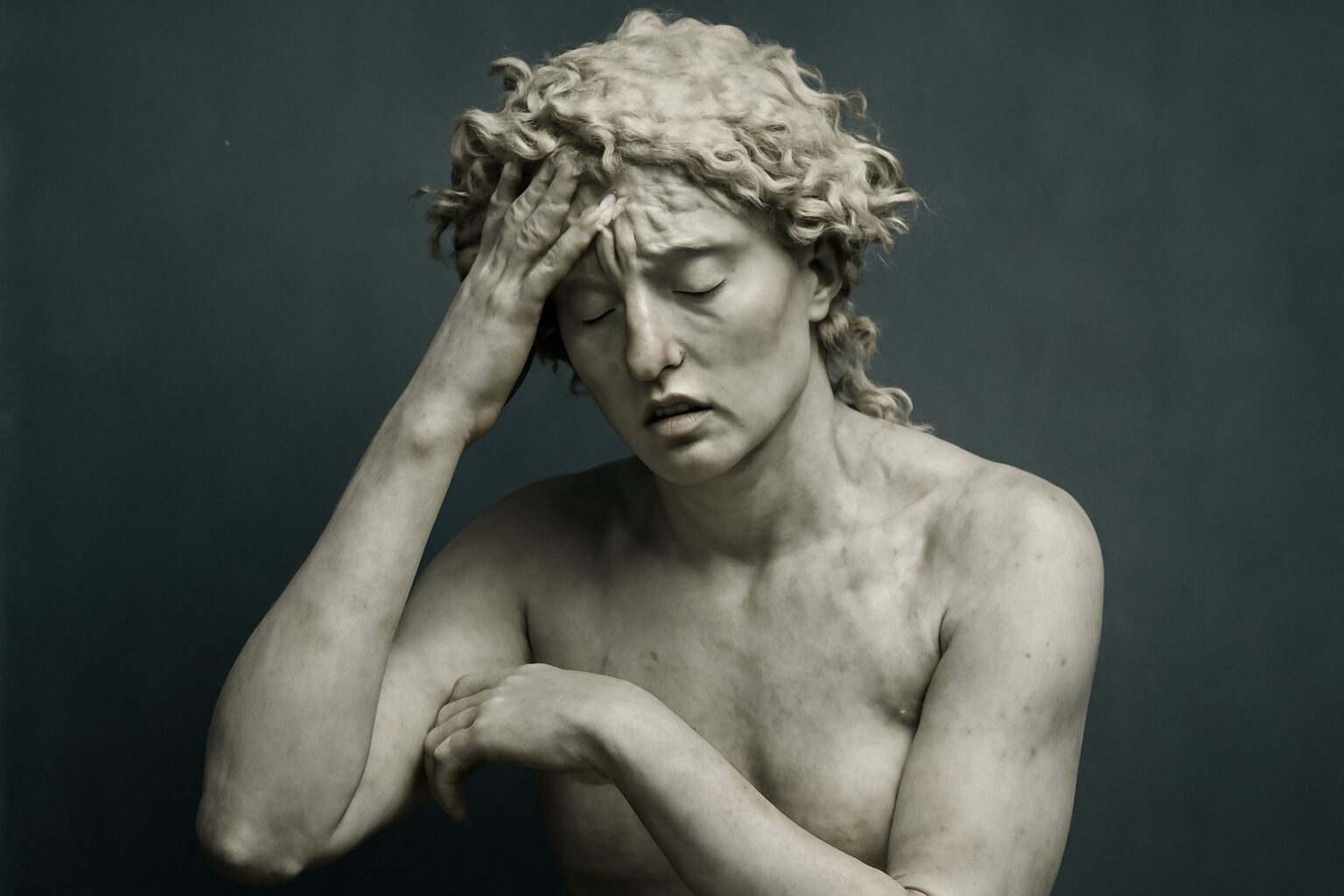Amekhania: The Personification of Helplessness
In the vast pantheon of Greek deities and personifications, Amekhania (Ἀμηχανία) stands as a lesser-known but fascinating figure. Her name translates to "helplessness" or "want of means," embodying the human experience of powerlessness in the face of overwhelming circumstances.
Origins and Role
Amekhania appears in Hesiod's Theogony as one of the many children of Nyx (Night), born without a father. She belongs to a group of dark, abstract deities representing negative human conditions, alongside figures like Moros (Doom), Oizys (Misery), and Apate (Deceit). As a personification, she wasn't worshiped like major gods but served as a poetic representation of human vulnerability.
Symbolism and Significance
In Greek thought, Amekhania represented more than just temporary frustration - she embodied the crushing realization of absolute helplessness. Ancient Greeks saw her influence in moments when:
- Mortals faced insurmountable divine wrath
- Heroes encountered problems no strength could solve
- Humans confronted the limits of their mortality
Her presence in mythology served as a reminder that even the mightiest heroes and kings could experience complete powerlessness before fate or the gods.
Relationships and Appearances
While Amekhania rarely appears in myths as an active character, her siblings form a "family" of negative forces:
- Mother: Nyx (Night)
- Siblings: Thanatos (Death), Hypnos (Sleep), Eris (Strife)
- Cousins: The Moirai (Fates)
Some scholars suggest she may have been worshiped in minor cults alongside other Nyx-born deities, particularly in contexts where people sought protection from helpless situations.
Cultural Legacy
The concept of Amekhania influenced later Greek philosophy, particularly Stoic thought about accepting what cannot be changed. While not as prominent as other deities, her personification of helplessness remains a powerful psychological concept that resonates across cultures and eras.
Alternative Names for Amekhania
God Name: Amechania (Greek)
A variant spelling of Amekhania, found in some ancient Greek texts, representing the goddess of helplessness and want.
God Name: Inopia (Roman)
The Roman equivalent of Amekhania, representing want or lack, often associated with poverty and helplessness in Roman mythology.
God Name: Aporia (Greek)
Another name sometimes linked to Amekhania in Greek texts, meaning 'without resources' or 'helplessness,' reflecting similar themes.
Tales about Amekhania
The Alliance of Amekhania and Aidos
In the shadowed halls of Olympus, where whispers of mortals often reached divine ears, Amekhania, the spirit of helplessness, wandered unseen. She observed a young artisan, Lysias, whose hands trembled with uncertainty as he attempted to carve a tribute to the gods. His tools slipped, his marble cracked, and despair clouded his eyes. Amekhania felt his anguish deeply, for it was her essence—the weight of incapacity—that gripped him.
Nearby, Aidos, the goddess of shame and modesty, watched as well. She saw Lysias’s cheeks flush with embarrassment at his failures, a reflection of her own domain. Moved by compassion, Aidos approached Amekhania. “Sister,” she said, “your presence is necessary, but let us not leave him in perpetual distress. Let shame guide him to humility, not ruin.”
Together, they visited Lysias in a dream. Amekhania showed him that his struggle was not a weakness but a human experience, while Aidos instilled in him the dignity to ask for help. Upon waking, Lysias sought guidance from a seasoned sculptor, embracing his limitations without shame. His eventual masterpiece, a statue of intertwined figures representing helplessness and modesty, stood in the agora as a testament to their divine intervention. In time, Techne, the spirit of art and craft, blessed the work with skill, while Sophrosyne imbued it with temperance, and Eupraxia ensured its success through good conduct.
Amekhania’s Encounter with Poros
In the earliest days of creation, when chaos still whispered at the edges of the world, Amekhania drifted through the void, her form a wisp of sorrow. She embodied the stark reality of having no means, no path forward. It was during this time that she crossed paths with Poros, the daimon of expediency and resourcefulness, who was weaving the first threads of possibility into existence.
Poros, ever vibrant and inventive, paused at the sight of Amekhania’s desolation. “Why do you linger in such emptiness?” he inquired, his voice echoing with potential. Amekhania replied, “I am the essence of no escape, the void where solutions perish.” Intrigued, Poros extended a hand. “Then let us create a balance,” he proposed. “For every instance of helplessness, I shall plant a seed of resourcefulness.”
Their collaboration birthed the first dilemmas of mortals—situations where helplessness met ingenuity. In one tale, a shipwrecked sailor, stranded with no oar or sail (a gift of Amekhania), discovered Poros’s inspiration in a piece of driftwood, crafting a raft to safety. This eternal dance between constraint and creativity became a fundamental rhythm of human existence, celebrated in myths and prayers alike. Later, Tyche added fortune to the mix, Caerus offered opportune moments, and Pistis provided the faith to persevere.
Frequently Asked Questions
What is Amekhania in Greek mythology?
Amekhania is the personification of helplessness or powerlessness in Greek mythology. She is one of the lesser-known daimones (spirits) representing abstract concepts and human conditions.
What are daimones in Greek mythology?
Daimones are minor deities, spirits, or personifications in Greek mythology. They represent abstract concepts, emotions, or natural forces rather than having full god status like Zeus or Athena.
Why were personifications like Amekhania important in Greek culture?
Personifications helped ancient Greeks understand and explain complex human experiences and emotions by giving them divine forms. They made abstract concepts more relatable and provided ways to discuss human nature.
How does the concept of Amekhania apply to modern life?
While we don't worship these spirits today, understanding Amekhania helps us recognize that feelings of helplessness are universal human experiences that even ancient cultures sought to explain and personify.
What can we learn from Greek personification spirits?
These spirits show how the Greeks viewed the world - seeing human emotions and abstract concepts as forces that influence life. They demonstrate the human need to explain and give form to our experiences.













